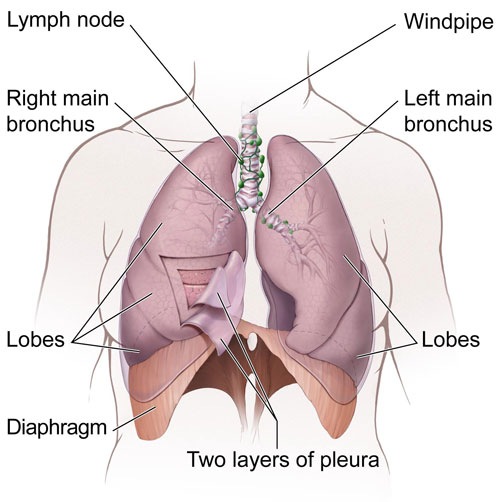
Lung Cancer
Lung cancer is a common and very serious form of cancer, with more than 40,000 people diagnosed with the condition each year in the UK. The symptoms of lung cancer do not present in the early stages, but when symptoms do eventually present, they usually include the following:
- Coughing up blood
- Persistent cough
- Shortness of breath
- Unexplained weight loss
- Unexplained weakness and fatigue
- Pain on coughing or deep breathing
Types of lung cancer
Lung cancers can occur in two ways, as follows:
- Primary lung cancer – This refers to cancer that originates in the lung tissue
- Secondary lung cancer – This refers to cancer that originates in another part of the body, but then spreads to the lung tissue
Primary lung cancer
Primary lung cancer is further classified into two main types, based on the type of cells the cancer affects. These include:
- Non-small-cell lung cancer – This is the most common form of lung cancer and accounts for over 80% of all cases. Depending on which cells the cancer affects, non-small-cell lung cancer is subdivided into the following types:
- Squamous cell carcinoma
- Adenocarcinoma
- Large-cell carcinoma
- Small-cell lung cancer – This type is less common and is more aggressive, spreading much more quickly than non-small-cell lung cancer.
Lung cancer is rare among people aged under 40 years. The incidence of lung cancer rises sharply as people age and is most common among those aged between 70 and 75 years. One of the main causes of lung cancer is cigarette smoking, which is the causative factor in around 90% of patients. Smokers regularly inhale a variety of toxic substances, which increases the risk of developing the condition. However, non-smokers can also develop lung cancer.
The treatment of lung cancer depends on which type of cancer a patient has, how far the cancer has progressed and the patient’s general state of health. When diagnosed early and if the cancer cells are confined to one small area, the cancer is usually surgically removed. In cases where surgery is not considered an appropriate option due to a poor health status, radiotherapy may be the advised treatment approach. In cases where the cancer is too far advanced to be treated with surgery or radiotherapy, chemotherapy may be prescribed instead.
 |
| The lungs and nearby tissues |
Sources
- www.nhs.uk/conditions/Cancer-of-the-lung/Pages/Introduction.aspx
- www.cancer.org/.../acspc-039558-pdf.pdf
- www.cancer.org/acs/groups/cid/documents/webcontent/003115-pdf.pdf
- www.cancercouncil.com.au/.../...derstanding-Lung-Cancer_NSW_FA_Web.pdf
- http://www.nlm.nih.gov/medlineplus/tutorials/lungcancer/oc079105.pdf
- patients.thoracic.org/information-series/en/resources/lung-cancer.pdf
Further Reading
Last Updated: Aug 23, 2018

































No hay comentarios:
Publicar un comentario